Eggs are a relatively cheap and highly nutritious meal. They are also one of the fresh foods that may be difficult to acquire when SHTF unless you happen to own a chicken.
While eggs are usually not what we think of when discussing stockpiles, there are various ways to preserve them and make them last longer than they usually would.
Don’t Wash Eggs
Unwashed eggs have a protective coating called bloom. They can be safely stored on the counter for three weeks. If stored in the refrigerator, they are good for up to three months.
Unwashed or not, once refrigerated, eggs should not be left on the counter for more than two hours.
Freeze Eggs
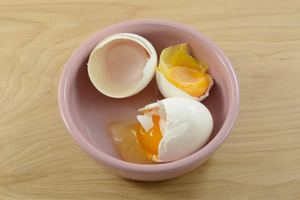 Did you know you can freeze eggs, whether they are raw or cooked?
Did you know you can freeze eggs, whether they are raw or cooked?
If you lightly scramble an egg and pour the mixture into an ice cube tray, eggs can last up to a year. This storage method is an option if you hope to have access to raw, uncooked eggs at any time, just defrost while cooking.
Alternatively, you can freeze eggs that have been cooked. If you have seen the breakfast sandwiches they sell at convenience stores, this is how they are made.
⇒ How To Make Calcium Supplements From Eggshells
When I make eggs to freeze, I usually scramble them using water rather than milk. I will cook up one large bath before separating it into portions to freeze in an airtight container.
You can also create small egg patties if you cook them in a muffin tin and then freeze them. I do this often and add other things like ham or peppers. These little egg bites are a favorite for kids.
Pickle Eggs
Pickling is not just for grandma anymore; this popular pastime is so easy that anyone can do it.
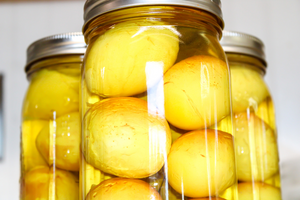
Pickling eggs is a great way to extend their shelf life and switch things up.
Here is a step by step guide on how to pickle eggs.
Pickled eggs have a shelf life of 6 months.
Cure Eggs
Cured egg yolks are all the rage right now and are so tasty. Curing is a popular form of preservation and is used on various foods.
You can cure eggs by coating them with salt. Add sugar to create sweet and salty eggs, or use flavors like rosemary.
To cure eggs, you must cover the unbroken egg yolk in salt, along with any other flavors you want to try. Ensure you are using enough salt to fully shield the egg entirely. Once covered, place the tray with the eggs and salt in a cool, dry place for a few weeks.
As the yolks harden, they absorb the flavors, leaving you with a solid mass that tastes amazing and can be rehydrated to use in other ways.
Dehydrate Eggs
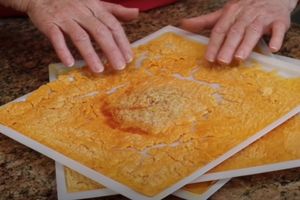 Mix the yolks and whites of the eggs and spread them on a lined baking sheet.
Mix the yolks and whites of the eggs and spread them on a lined baking sheet.
Dry the eggs in a low-temperature oven or use a dehydrator.
Dehydrating eggs can get a bit complicated, but we will try to keep it simple.
Remember that eggs should always be fully cooked before drying to prevent the risk of food poisoning.
To dehydrate eggs, scramble a half-dozen in a bowl. Cook entirely in a non-stick pan. Arrange the cooked eggs on the dehydrator pan – you want to ensure there are no large chunks. Dehydrate at 150 degrees for approximately 4 hours.
While you can dehydrate eggs in an oven, it will take significantly longer – like 10 hours at 165 degrees. Therefore this method is excellent if you own a dehydrator, but it takes a long time if you do not.
Powder eggs
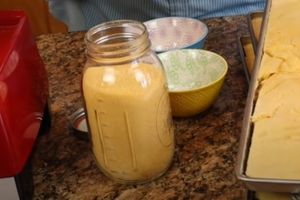
Powdered eggs are a popular option for storage, but they can be pricey. Make egg powder at home, dehydrate eggs using the previous instructions, and grind them into a fine powder.
Related: How to Make Powdered Eggs
Store egg powder in an airtight container.
Honey And Salt
You can preserve eggs by coating them with honey and salt and storing them in a cool, dry place. Ensure the eggs are thoroughly covered in honey and salt and there are no bare spots to be seen.
I could not find a source for this storage method, but it is an approach my grandma said her mother used. Take it with a grain of salt.
Use Sugar To Preserve Eggs
Create a natural preservative by mixing equal parts egg whites and sugar, and coat the eggs before storing them. This process works with the natural coating of the egg to extend its shelf life.
Make Century Eggs
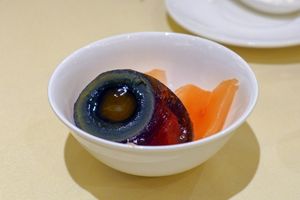 Creating century eggs was a long process typical in kitchens back in the 1800s. I found many recipes for this process, some for raw eggs and others for boiled.
Creating century eggs was a long process typical in kitchens back in the 1800s. I found many recipes for this process, some for raw eggs and others for boiled.
The traditional method involves coating the eggs in a mixture of clay, ash, and water to create a protective layer.
Here is a step by step guide on how to make century eggs.
Make Egg Jerky
Mix eggs with your choice of seasonings, and a sweetener (sugar or honey), then spread the mixture thinly on a lined baking sheet.
Dry at a low temperature in the oven (e.g., 165-175 degrees) for several hours, and you can create what can be called egg jerky.
Sundried Eggs
An interesting idea I encountered involved drying eggs in the sun by placing them on a tray or rack in a sunny location and allowing them to dry out completely. I question the safety of this process, but it appears to be popular.
Store Eggs In Lime And Water
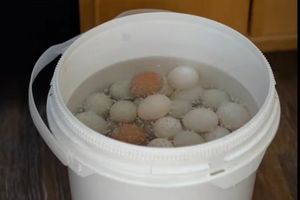 Another historical preservation of eggs is storing them using lime and water.
Another historical preservation of eggs is storing them using lime and water.
This preservation method is also know as water glassing.
Keeping your eggs in a mixture of lime and water will help to preserve them and prevent the growth of bacteria.
Add an equal ratio of water and lime to your bucket. Mix until dissolved. Gently place eggs into the container.
Related: How To Preserve Eggs with Water Glass
Secure the lid to prevent evaporation. Store in a cool, dark, and dry location. Pull eggs as needed, and wash before use.
Preserve Eggs In Salt
Salt has long been used to preserve eggs. However, preserving the entire egg is a bit different.
Try this by boiling a mixture of 1c salt and 4c water and allowing it to cool. Place eggs in a large glass jar or other container and pour the mixture over the top, ensuring all the eggs are covered. Store them in a cool, dark, and dry place for 3-4 weeks.
Curing will depend on how salty you want your eggs to be. Test if the eggs are done by removing and boiling one egg and tasting it. If it is good enough, remove the rest. If not, let them sit longer.
Salted eggs can be stored in the fridge for a month or boiled and frozen for much longer.
Preserve Eggs In Oil
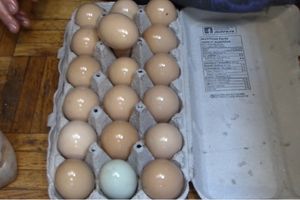 Coating eggs in mineral oil and putting them back in the carton with the pointy side down will make your eggs last much longer. Rotating them monthly is strongly recommended.
Coating eggs in mineral oil and putting them back in the carton with the pointy side down will make your eggs last much longer. Rotating them monthly is strongly recommended.
If you keep them in a cool, dark and dry place, they should stay good for up to nine months.
Wax Eggs
Use wax to coat eggs and create a protective barrier that will help preserve them. I stumbled across an article about coating eggs in Vaseline to extend their shelf life, and I was initially hesitant. However, it seems many people use this method, and some say it makes their eggs last for months.
⇒ Learn How To Keep Eggs Fresh For At Least A Decade
Besides Vaseline, food-grade mineral oil can be used to coat eggs, or any oil that does not spoil, such as coconut oil. Just remember to store them with the fat end up to avoid issues related to the air bubble that naturally lives within an egg.
I’m pretty sure this approach works because it locks in the natural coating on freshly laid eggs, keeping them fresh.
It is important to note that this method would not work on grocery store eggs as they have already been sitting for some time.
Egg Noodles
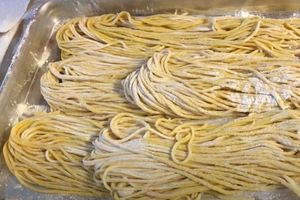 Create egg noodles by mixing eggs, flour, and salt and then drying the noodles in a low-temperature oven. Once dried, store in an airtight container.
Create egg noodles by mixing eggs, flour, and salt and then drying the noodles in a low-temperature oven. Once dried, store in an airtight container.
Making egg noodles is another way to use up and preserve eggs all at the same time. Plus, egg noodles are super easy to make and delicious.
Create Egg Glue
You can create an egg-based glue by mixing egg whites and flour and then boiling it until it thickens. This ‘glue’ can be used on almost anything.
Related: How To Keep Eggs Fresh For A Year With Isinglass
Preserve Eggs In Alcohol
Eggs just became a lot less boring in my mind. If you soak eggs in a mixture of alcohol and water for several weeks, you can store them for an extended period.
Make Egg Tofu
To make egg tofu, mix eggs and a coagulant, such as vinegar or lemon juice, and cook until it forms a solid mass.
Egg tofu is surprisingly easy to make, provided you have a steamer. You will need the following: 6 eggs, 1/8 tsp salt, 300 ml of soy milk.
Beat the eggs in a bowl, slowly adding the soy milk while mixing, followed by the salt. Strain into a new bowl to remove any clumps.
Pour into a steamer-safe container and slowly steam for 25-30 minutes. Cut and enjoy or store/freeze in an airtight container
Make Egg Drop Soup
Egg drop soup is a good option for using up eggs and storing them safely. My favorite uses cornstarch and chicken stock as the base, with soy sauce, ginger, onion, celery, and peppers for added flavor and texture.
Once you make this base by mixing all these ingredients, add eggs that have been beaten and gently stir.
Storing eggs long-term is a bit more complicated than storing other foods, but as this list shows, it can be done. With patience, creativity, and knowledge, you can have eggs any time, even in an emergency.
Do you have any tips for storing eggs long-term?
You may also like:
 Self-Defense Weapons That Are Illegal In Your State. Do You Have One Of Them?
Self-Defense Weapons That Are Illegal In Your State. Do You Have One Of Them?
The ‘Superweed’ That Saved Large Communities During The Great Depression (Video)
11 Things You Believe About EMPs and Faraday Cages That Are Actually Wrong

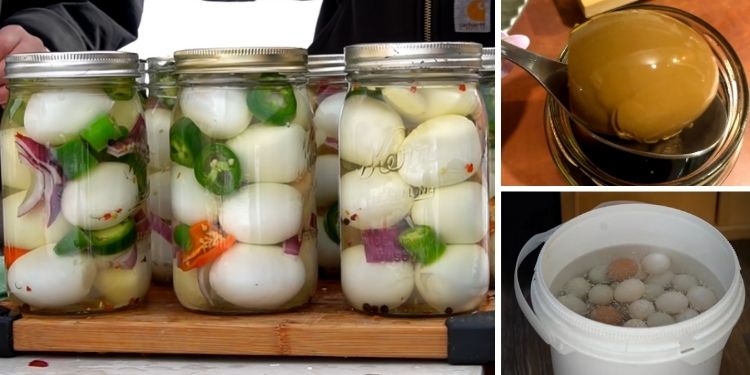













Limeing works well…. Just a note would be to “not fill the 5 gallon bucket full of eggs ” you can crush the lower layer of eggs and you end up with a create power scent.
Freeze Dryers are awesome and work well. My Ex wife will freeze dry the extra eggs in exchange for special favors
Hi! Wanting to confirm something with the Lime method (not just for me, but anyone reading who doesn’t have experience with Lime)… There are different limes available to be used for agriculture and processing/preserving foods, is that correct? It seems to me that my great-Aunt Max did pickles with a food grade lime almost 100 years ago. There are agricultural and food-grade (or otherwise safe for human consumption) limes, is this correct? Thanks bunches!!
don’t see any mention of a regular “flip” of the whole preserved eggs – most recommend it to keep the yolk/white from sticking to the eggshell >>> preserving in egg cartons instead of loose makes the flip eazier and an organized schedule possible ….
I also recommend a pop cooler for storage vs storing in something uninsulated like a bucket or a tote – eggs could be at a premium and a hasp/lock prove handy …..
Always good info! Thank you very much!
A couple of things I do to the eggs for long-term preservation is within a couple of days after being laid, I take a the eggs into a dark closet and put each one on top of a super bright flashlight to check for any cracks. Those that pass take the float/sink test. I take a large bowl filled with water and place a few eggs at a time in it. The ones that sink are the freshest and are the candidates for long-term oil slathered storage.
This next year, I plan on preserving with slaked lime instead of the mineral oil I’ve used in the past, due to it being a petroleum product. Egg shells have micro pores and I don’t want to ingest a cancer causing agent into my body. Especially since I consume three eggs daily religiously. I also dry out the shells of the ones that won’t be preserved and grind them into powder in my coffee bean grinder to give to the chickens for additional calcium supplementation and the woman stirs a little into her morning coffee.
And yes, as Illini Warrior mentioned, it’s very important to flip the eggs once every week. The yolks get gooey and stick to the shell when they’re cracked open if they weren’t rotated.
Thanks for that! Now all I need to do is get some chickens for super fresh eggs.
Do you flip glasses eggs too? I am just getting ready to try glassing eggs for the first time and am ignorant.
I got the answer. First cook. Then freeze dry. Put in mylar bag or glass mason jar with oxygen absorber. You can leave them scrambled or make powder after freeze drying.
I have been buying eggs from the grocery store and covering them in food grade mineral oil, setting them back in the carton point side down.. I turn the eggs every month. So far I have been able to preserve them this way for up to 6 months. The biggest problem is dehydration. The egg whites are dehydrating inside the egg.
Other than that I’d say this method works very well and is easy to do. I have gone thru 15 dozen eggs with no losses.
my comment has nothing to do with preserving eggs but i do have a question. Has anyone seen or heard from clergylady or leftcoast chuck lately. I have not seen them on here for quite some time.
Hopefully they moved on
I’ve limed my spare eggs in thepast, but unless you have root cellar conditions to keep them, they don’t have a great shelf life – a few months at best. I now freeze mine…I simply crack them into a silicon 12-muffin mould, each muffin cup perfectly fits one egg, which is in the feeezer. Next day I pop out the frozen eggs, put them into a buket or large container also in the freezer and repeat with any new extras. Just thaw overnight in the fridge and use as you would normally. I’ve got several hundred extras from my chooks in there right now. I found a delicious and easy way to use a lot at once is to take 3 dozen frozen eggs and put them into a large glass or ceramic baking dish, cover and leaveovernight in the fridge. Next day, take the thawed eggs, put bacon and onion on top then cover with flakey puff pastry and bake…delicious bacon-and-egg pie!
Sorry for the crappy spelling, trying to type with a broken arm…missed a couple
I freeze my eggs. Break into a ice cube tray or a silicon mold. Pierce the yoke. Freeze. I then put two eggs into a vacuum sealant bag. (The number I usually need.) Freeze. To use I just thaw what I need ) Works for scrambled eggs, cake mixes, anywhere you need whole eggs. We can’t tell any difference from fresh eggs.
I don’t even break the yolk, I find it freezes and thaws just as well, and you then have whole yolks for fried eggs or pies.
Thanks for the great article and comments with or about other methods!! I’ve been looking at different ways to preserve some eggs long-term as they are a daily staple in our diets, and with the way the country is going, I fear that eggs will become unavailable or unaffordable in the not too distant future!
One question for those who dehydrate and powder their eggs: how much powder would be equal to say, a large egg? And what is the best way to reconstitute powdered eggs for use in something like a cake or egg noodles?
Thank y’all so much for the info/help, and Merry whatever you celebrate this time of the year (We do Christmas here).
I scramble then freeze dry the egg liquid. Powder them in the blender and package in mylar with oxy absorber. Use 2 Tbl egg to 2 Tbl water. You csn add some freeze dried cheese when reconstituting to make a cheese scramble or omelet.
These are great recipes for storing eggs. I have used the freezer method. Unfortunately, that method isn’t for long term use…in a SHTF scenario, you most likely won’t have a usable freezer….
No power. I might try oiling them, but NOT MINERAL oil…..petroleum, no thanks!
Beeswax or other similar oils.
Also, thinking about dehydrating /freeze drying.
I have used pickling lime in water to preserve my farm fresh eggs, not store bought which have been washed. Used 1 oz of the p lime in 1/2 gal of water in a gallon glass jar. Was able to put 33 eggs in it. Tried some after 9 months, good. Ate the rest after 1 year, still good. Kept in a cool dark room. Have another jar of eggs, going to try for 15 months.
How long would “cured eggs” (with salt, as described in this article) last?
i am learning
3-21-21 Egg Storage in Pickling Lime Experiment started
Assumptions and materials needed:
FRESH EGGS NOT FROM GROCERY STORE
NOT MORE THAN 3 OR 4 DAYS OLD. THESE EGGS WERE TAKEN FROM HOMESTEAD CHICKENS. THE EGGS MUST STILL HAVE THEIR NATURAL BLOOM.
NOT WASHED BUT WIPED CLEAN WITH A DRY CLOTH
PICKLING LIME (calcium Hydroxide)
LARGE GLASS JAR AND LID TO HOLD EGGS. (I used 12 eggs)
TAP WATER
Procedure:
1) Mix 1 Quart water with 1oz or 2 heaping tablespoons of pickling lime (calcium hydroxide)
If you need more liquid to cover the eggs double up the recipe.
Recipe stays the same 1oz to 1quart. Solution quantity depends on the jar size and egg quantity.
2) Gently place eggs into jar and pour solution over the eggs. Cover eggs entirely. Place lid cover on Jar and store in a cool dark place. I gently swished the solution around a couple of times the first week to make sure the eggs were completely covered especially where the eggs were touching.
3-21-22 Eggs still good after 1 year. Egg white seemed a little thicker, shell a little harder. Taste a little different (like older eggs.) but this could have been just me.
Check in 3 months.
6-21-22
Eggs still good. The shells are still hard and when I cracked the eggs, I broke the yokes. I scrambled 2 eggs and smelled them for bad odor and inspected them for discoloration. No odor or discoloration found. They seemed a little thinner. Fried in pan with a little butter and salt and pepper. I ate them they tasted fine.
Check in 3 months a total of a year and a half.
9-21-22
Eggs still good; although, 1 egg developed a crack and was discarded. I tried to open it; but it sounded like a hard-boiled egg.
I scrambled 2 additional eggs and ate them. They smelled fine and tasted fine and I saw no discoloration.
Check in 3 months a total of 21 months.
12-21-22
Eggs Still good; although, 2 more eggs developed cracks and were discarded.
I opened 2 more eggs to eat. The shells were harder and opening them was more difficult. The Yokes broke; so, I scrambled them. They smelled and looked fine. I cooked them in a pan with a little coconut oil, salt, and pepper. They tasted fine and the texture seemed normal.
3-21-2023
It has been 2 years since I started this experiment. I lost 1 more egg due to cracking in the solution. The eggs remaining were examined for cracks, discoloration, odor, and taste ????
Conclusion:
This storage method works well for storing fresh eggs for 2 years or maybe longer.
I lost 4 eggs because of cracking in the solution. The cause unknown. Maybe because the point of the eggs were not pointed down.
These 4 eggs were discarded.
The taste, smell, texture, and color of the eggs I ate is/was Acceptable.
I tried to hard boil several of the remaining eggs instead of frying or scrambling. This did not work out because they all cracked while boiling and they did not set like a normal hardboiled egg.
The hardboiled egg method I used: bring room temp Eggs and water to boil. Shut off heat, cover pot, and let the eggs cook in the water for 9 minutes. This method usually makes an egg have firm white and yoke without discoloration. Some people like the yoke a little less cooked.
If the concern to store eggs this way is because of the slow down of egg production in winter months, do this several months before winter and collect as many eggs as you think you will need in the winter.
If you purpose is general storage this method works well; However, the quality of egg does decline but the taste, color, smell, texture was acceptable to me.
Some major Universities do not approve of this method using pickling lime (Calcium Hydroxide) or Water glass (Sodium Silicate) to preserve Fresh eggs. They have concerns regarding cleanliness’, egg fertility, salmonella transfer (from shell to inside the egg).
With care taken, I did not have any problems.